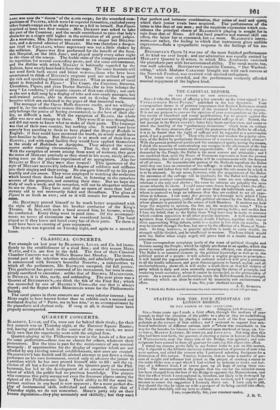THE CARDINAL REFORM.
TO THE EDITOR or THE. SPECTATOR.
Stn—I take the liberty of offering a few remarks on the letter signed " AN UNERANCHISED RENT-PAYER," published in the last Spectator. Your correspondent deems it of primary importance that Radical Reformers should arrive at unanimity as to the extent of the increased franchise they require. It is not my purpose to canvass the opinions of your correspondent on the rela- tive merits of household and rental qualifications, but to protest against the policy of just now mooting the question of extended suffrage at all. Indeed, the last passage in the RENT.PAYER's letter fully bears out this view, and seems to attest the inutility of the "preliminary discussions" which form its subject matter. Ile truly observes, that " until the protection of the Ballot be afforded, it is to be feared that the right of suffrage will be regarded as a questionable good, if nut a positive evil." Then why distract and weaken the popular advo- cacy of the Ballot by preliminary discussions of a measure necessaiily ulterior? With the present posture of parties and the unremoved apathy among the masses, I think the necessity of concentrating our energies in the attainment of the key to all other measures becomes almost unquestionable. Of all real reforms now demanded by the People, the Ballot is the most mature and attainable; and I am confident that, until the House of Commons repro-eats at least the present constituency, the refusal of any reform will be commensurate with the demand of all at once. No inconsiderable portion of the Radicals repudiate the Ballot until they can have an extension of the suffrage: in other words, they insist on having the end before they will condescend to accept the sole means by which it is to be attained. In one sense, however, with the acquirement of the Ballot the extension of the suffrage will be identical ; for the Ballot will render real the present nominal constituency. Wherever votes are now suborned, the suborner is the only real elector ; the votes he suborns are palpably the mere means whereby lie elects. I could name some dozen boroughs where the effec- tive constituency, is comprised in not more than six individuals each, and in whom is centered so large an influence that they are enabled to set all oppo- sition at defiance. I ran name fire persons in a borough with which I have some slight acquaintance, (called into political existence by the Reform whose pleasure is potential in the return of both Members. It matters not how large the majority in opinion, the five are the majority, in votes.• This is assuredly much inure frequently the case in Tory strung. hulls ; and on this fact I base my belief, that to the Ballot those Whig fears may be made to minister which confirm opposition to all other popular measures. A well-systematized agitation from Cornwall to Caithness, would, I believe, together with two or three approaching Whig defeats, settle ilia matter in less than six months. It may be carried through the fear, but never by the affection of a House of Nomi- nees. So long, however, as popular agitation is made to carry double, its. strength will be divided, and be insufficient to success. The fears which would cede the Ballot when singly urged; will prove fatal to a double demand on concession.
Your correspondent complains justly of the want of political thought and decision among the People ; which he rightly attributes to an apathy, which the power to render politics practicable, and decision efficient, can alone remove. The Ballot is an essential element to the political knowledge as well as to the political power of a people: it will .achieve a mighty progress to principle— it will herald the regeneration of the national niind—it will give a premium to all the kindly influences, and great discouragement to hatred, malice, and all uncharitableness; above all, it will strike a death-blow at that fell idolatry of party which is daily and even avowedly usurping the shrine of principle, and rendering truth secondary, where it cannot be reconciled, to the partisauship of. power. As a means to all amelioration, surely the Ballot demands that strength of advocacy which can alone be rendered by unanimity and exclusiveness of
effort. I am, Sir, your obedient servant,
J. C. Svirows.
• I think the Ballot would increase the real constituency about :ill° per mt.


























 Previous page
Previous page